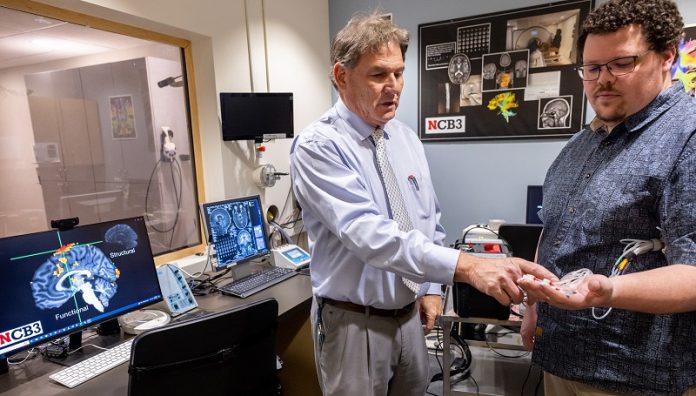
A team of researchers from the University of Nebraska–Lincoln, led by Professor Steven Barlow, has developed a new device that could speed up recovery for stroke patients.
The portable device, called the pTACS Somatosensory Biomedical Device, has just been granted a U.S. patent and may one day be used in emergency rooms, rehabilitation centers, and even ambulances.
More than 795,000 people in the U.S. suffer a stroke each year, and quick treatment can make a big difference in how well patients recover.
The pTACS device offers a simple, non-invasive way to help the brain heal faster.
The device works by sending tiny bursts of compressed air to touch-sensitive areas of the body like the hands, feet, or face.
These pulses activate nerve responses that reach damaged areas of the brain and help improve blood flow to those regions.
This process can stimulate brain cells and may help save them from dying after a stroke.
Barlow and his team built the pTACS device to be compact, easy to use, and affordable. All the hardware and software fit inside a small black toolbox powered by a rechargeable battery—the same kind used in smartphones.
It connects to a small laptop that controls the air pulses using settings based on years of research.
This new tool builds on earlier work by Barlow’s team, who previously developed a larger version called the Galileo. After many successful trials with stroke patients, the team focused on creating a lighter and more portable version that could be used in more locations.
In tests, the pTACS device helped patients recover movement and other brain functions—even those who had strokes years earlier. Barlow said some patients who were two or three years past their stroke still showed major improvement with the therapy.
The pTACS device may also be used for other treatments in the future. Barlow and his team are already exploring ways it could help with speech and language therapy, balance and walking recovery, and even support for people with autism spectrum disorder.
In a current study, the device is being tested in an MRI setting to examine how foot stimulation affects brain activity related to balance.
With help from NUtech Ventures, Barlow hopes to launch a startup company to bring the device to market after getting approval from the FDA. He has done this before—his earlier invention, the NTrainer System, is now sold globally.
Barlow believes this is just the beginning for pTACS. He and his team are excited about its potential to improve lives, and they are working hard to uncover more ways it can be used in therapy.
If you care about stroke, please read studies that diets high in flavonoids could help reduce stroke risk, and MIND diet could slow down cognitive decline after stroke.
For more health information, please see recent studies about antioxidants that could help reduce the risk of dementia, and tea and coffee may help lower your risk of stroke, dementia.
Source: University of Nebraska-Lincoln.



